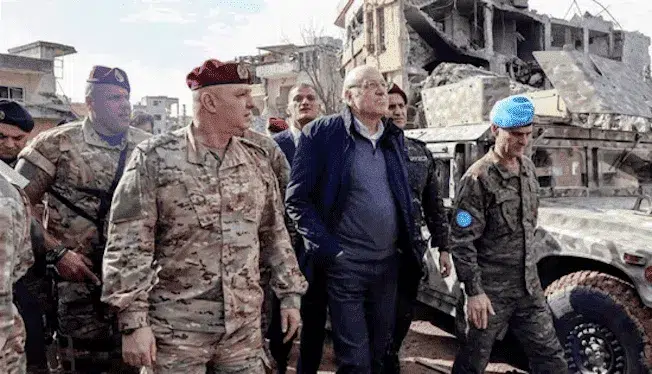|
إستماع
Getting your Trinity Audio player ready...
|
Topping the list of reasons for lack of Lebanese interest, all presidential hopefuls need Hezbollah votes
Lebanon is not serious about enforcing the UNSC Resolution 1701 mechanism agreement that it signed with Israel on November 27 and that ended 14 months of war.
Before the ceasefire, the Lebanese Armed Forces (LAF) watched Hezbollah hollow out 1701. The military justified its idleness by blaming the executive power for not issuing orders. After Lebanon’s caretaker cabinet endorsed the deal, LAF continued to drag its feet, for no obvious reason other than the political ambitions of its chief, presidential hopeful Joseph Aoun.
US Envoy Amos Hochstein is scheduled to visit Beirut on Monday to discuss Lebanese failure in meeting deadlines set by the ceasefire’s timetable.
Hezbollah now seems to have a new tactic. Instead of boasting about its capabilities in warring with Israel, the Iran-backed militia has instructed caretaker Prime Minister Najib Mikati to pretend that Lebanon has lived up to its part of the deal, and that it is now incumbent on the Jewish state to stop its “violations” and accelerate its withdrawal from Lebanese territory.
What Mikati called violations were in fact Israel enforcing 1701 by striking Hezbollah’s rearmament shipments, an arrangement that Lebanon had signed on to. The deal also stipulated that the Israeli military would control up to five miles of Lebanese territory as long as Hezbollah maintains its ability to reconstitute. Israel promised to return the no-man’s land when the LAF has disarmed Hezbollah and neutralized its threat.
From the sliver of Lebanese territory that Israel controls, the Israel Defense Forces (IDF) dug up Hezbollah arms caches, confiscating 85,000 items, including missiles, rockets and launchers, enough to arm a mid-size army.
Meanwhile, Mikati and Aoun visited the southern town of Marjaayoun, signaling that the state had now restored its sovereignty south of River Litani. But the Lebanese state and its army have yet to show a single bullet that they have confiscated from Hezbollah.
Unlike the IDF, the Lebanese army busted rings of narcotics trade and petty crime. The LAF posted pictures of the arms that it had confiscated, not enough to field a neighborhood militia.
Not only did the state of Lebanon and its army fail to find a single Hezbollah handgun, the militia carried on with its efforts of rearmament – forcing the IDF to strike Hezbollah assets on more than one occasion. Israel warned that war might resume if Lebanon failed to disarm the Iran-backed militia as agreed upon in the ceasefire deal.
Reasons behind Lebanon’s unwillingness or inability to disarm Hezbollah are many.
First are the political ambitions of presidential hopefuls like Aoun. Election requires two thirds of lawmakers, and that is impossible without the Hezbollah-led parliamentary bloc.
Second is Hezbollah’s bullying of Lebanese politicians and the general population. Wafiq Safa, Hezbollah’s fearsome tsar of Lebanese domestic affairs, emerged as the only survivor from the militia’s top echelons. Safa had cut his teeth on bullying opponents and twisting arms. His presence continues to be felt.
Third is the utter incompetence of Hezbollah’s opponents. Even though the parliament has a solid bloc of 31 (out of 128 lawmakers) that calls for the militia’s disarmament, the opposition has failed to expand its ranks or to pose any serious political threat to Safa or his militia.
Fourth is the failure of world capitals to agree on a coherent strategy. These capitals also disagree over who should be elected president. France has $30 billion worth of contracts with Iran that it hopes to see revived one day and has thus emerged as an ally of Hezbollah.
America’s “de-escalation” band-aid policy, under which it has endorsed the appeasing Aoun as its candidate for president, has undermined Saudi Arabia’s support for Lebanese Forces Party chief Samir Geagea, the most serious anti-militia candidate and one who has survived a Hezbollah attempt on his life.
Lebanon has yet to understand that Israel is dead serious about disarming Hezbollah, and that the Jewish state is not in the mood for pretend games. Unless Beirut understands this, its policy risks reigniting the deadly and devastating war.
Hussain Abdul-Hussain is a research fellow at the Foundation for the Defense of Democracies (FDD). Follow him on X @hahussain

